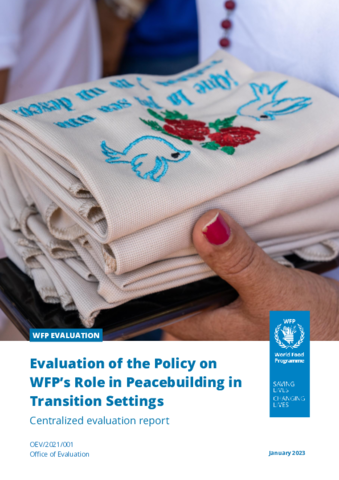
The WFP policy on the WFP’s role in Peacebuilding in Transition Settings was issued in 2013, and its evaluation has been initiated in 2021.
The evaluation aimed to explore the effects that the presence, programmes and interventions of WFP have on conflict and peace dynamics, relevance of policy implementation measures and enabling and hindering factors.
It assessed the relevance, effectiveness, coherence and sustainability of the Policy and its implementation from 2012 to 2021. The overall approach and timeline were adjusted in light of the COVID-19 pandemic.
The evaluation concluded that:
- Delivering assistance in a conflict-sensitive way remains key to ensuring that WFP does no harm and works in a people-centred way. This is of particular importance as WFP has been increasing its focus on “changing lives” alongside “saving lives”, which entails greater engagement with national and local authorities, requiring a careful balancing with neutrality and impartiality.
- The evaluation concludes that the policy is well formulated and remains relevant, and that WFP’s main contribution to peace continues to be its work on food insecurity, resilience and livelihoods. However, gaps remain in conflict-sensitive programming, and in enhancing the practice and use of context and conflict analysis to inform programme and process adaptations.
- If WFP can make progress on the priority issues identified in the evaluation, it can become a more conflict-sensitive organization because it already holds the other keys to making the shift work. Firstly, the peacebuilding policy remains relevant and provides an adequate and sufficient framework to orient WFP’s work in conflict and post-conflict- and transition settings. Secondly, the country-based conflict advisers who have recently joined the organisation have the necessary expertise, though sufficient capacity in regional bureaux and headquarters to effectively support the peacebuilding policy uptake is needed. Thirdly, guidance documents, trainings and relevant partnerships arrangements exist; they only need to reach the right people within WFP and among cooperating partners.


